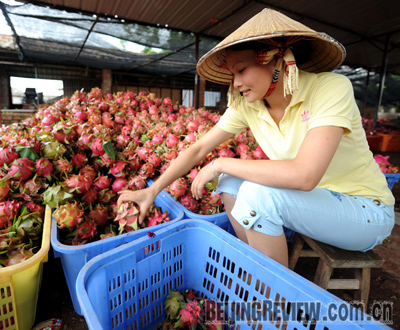| 
RURAL WOES: The Chinese Government has doubled its efforts in
recent years to narrow the urban-rural income gap.
Bridging the urban-rural gap seems like a mission impossible for China. The income disparity between its rural and city residents has been continuing to widen despite stiff government efforts to narrow it.
The per-capita net income of the country's rural residents reached 4,140 yuan ($610) last year, rising 9.5 percent compared to 2006-the highest growth rate since 1985, according to a Ministry of Agriculture report. But during the same period the per-capita income of urban residents grew even faster to 3.33 times that of rural residents for a difference of 9,646 yuan ($1,411), creating the largest gap in three decades, the report said.
But the problem cannot be blamed on the government, which has tried to improve the situation for rural residents by suspending the agricultural tax, creating subsidies for an array of agricultural products, and putting in place protective measures for rural migrant workers. Besides this, central finance has increased its general spending on agriculture, the countryside and farmers by 38 percent this year to 595.6 billion yuan ($87.1 billion). Of this amount, subsidies for farmers have doubled to 102.86 billion yuan ($15.05 billion).
So what is holding back the narrowing of the income gap between rural and urban residents?
Sun Zhengcai, Minister of Agriculture, said in the report that the country's entrenched social system barriers were to blame. The rigid household registration system prevents the free movement of rural workers into cities, and the national resource allocation system favors urban areas over the countryside. As a result, the income growth rate of farmers has fallen well below that of urban residents in recent years.
According to an article in Outlook Weekly magazine under the Xinhua News Agency on September 8, the per-capita disposable income of urban residents climbed 7.7, 9.6, 10.4 and 12.2 percent each year between 2004 to 2007, 0.9, 3.4, 3 and 2.7 percentage points higher, respectively, than that of rural residents during those same years.
Cheng Ruihua, an analyst with the Financial News, echoed Sun's opinion, saying that the countryside has fallen behind in development, because the government has focused primarily on developing and expanding cities and industries. Since the introduction of the opening-up and reform policy 30 years ago, the country's economic reorganization has centered on state-owned enterprises and left rural social barriers almost untouched. These imbalances between urban and rural areas would continue to hamper the countryside's development, Cheng said.
Besides this, the big increase in farmers' incomes may fizzle out because of uncertainties hanging over the country's agricultural production, Sun said. Cost inflation jitters are likely to erase the agricultural gains, he said.
| 